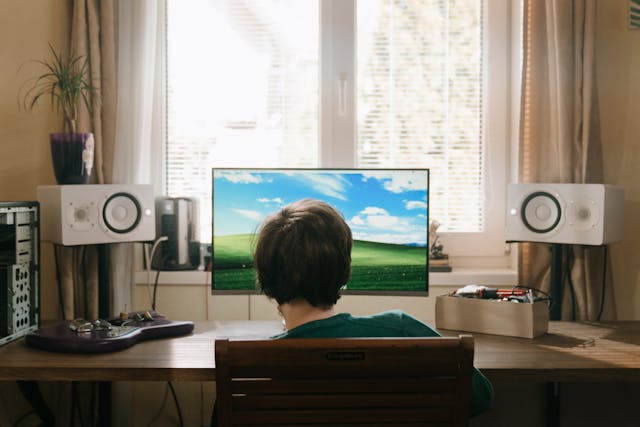🎨 Introduction
Let’s be honest—default Windows themes and icons can get boring fast. If you spend hours in front of your computer every day, it only makes sense to make it feel a little more you. Customizing your Windows desktop is not just about aesthetics—it’s about personal productivity, mood, and comfort.
Whether you want a minimalist vibe, a retro Windows 98 look, or even a full macOS clone, Windows gives you the flexibility to do it all. In this guide, we’ll break down how to customize your theme, icons, folders, and more, even if you’re not tech-savvy.
🧰 Prerequisites for Customization
Before we start turning your PC into a work of art, make sure you’re ready.
✅ Windows Versions Supported:
-
Windows 10 (All Editions)
-
Windows 11 (Pro and Home)
✅ Admin Access:
You’ll need administrator privileges to install system themes and apply icon packs.
✅ Backup Your System:
Always create a restore point before making deep customizations. You’ll thank yourself later.
🎭 How to Change the Windows Theme
🌈 Using Built-in Themes:
-
Right-click the desktop > Personalize
-
Click Themes > Choose from default options
🛍️ From Microsoft Store:
-
In the Themes panel, click Get more themes in Microsoft Store
-
Download and apply with one click
🧩 Importing Custom Themes:
-
Download
.deskthemepackor.themefiles -
Double-click to install, or manually copy into:
🌐 Downloading and Installing Third-Party Themes
Custom themes open up endless design possibilities, but be cautious.
🌐 Trusted Websites:
⚠️ Installing UXTheme Patcher:
Many custom themes require patching system files, which may void warranties or cause bugs.
-
Download UltraUXThemePatcher
-
Run as Admin
-
Reboot
-
Apply third-party themes via Personalization menu
Important: Always create a restore point before patching.
🖼️ Changing Desktop Icons
Time to swap those bland Recycle Bin and This PC icons for something cooler.
🔧 How-To:
-
Go to Settings > Personalization > Themes > Desktop icon settings
-
Click the icon you want to change
-
Browse to your custom
.icofile -
Apply and save
🔁 Recommended Icon Formats:
-
.icois required. You can convert PNGs using tools like ConvertICO.com
📁 How to Change Folder Icons
🖱️ Manual Method:
-
Right-click any folder > Properties
-
Click Customize > Change Icon
-
Choose or browse for your icon
🛠️ Folder Marker Software:
Apps like Folder Marker let you batch-apply icons and color-code your directories.
🎨 Make Your Own Icons:
Create .ico files using:
-
GIMP
-
IcoFX
-
Photoshop + Plugin
🧲 Customizing Taskbar and Start Menu Icons
🧩 Using Start Menu Tools:
-
StartIsBack, Start11, or Open Shell allow full Start Menu customization.
📌 Taskbar Tweaks:
-
Go to Settings > Personalization > Taskbar
-
Choose Left or Centered Start Menu
-
Use tools like TaskbarX for transparent or animated taskbars
🧳 Using Icon Packs for a Full-System Makeover
🎒 What’s an Icon Pack?
Icon Packs replace multiple system icons at once, giving a consistent design language.
⚙️ Installation:
Use tools like:
-
IconPackager (by Stardock)
-
7TSP Icon Packs with 7TSP GUI
🛑 Restoring Defaults:
If you get tired of the theme, use the tool’s restore function or apply a default Windows theme.
🛠️ Best Tools for Icon & Theme Customization
| Tool | Use |
|---|---|
| Rainmeter | Skins, widgets, and layouts |
| UltraUXThemePatcher | Enables third-party themes |
| IconPackager | One-click icon changes |
| Winaero Tweaker | UI tweaks and visual changes |
🎨 How to Create Your Own Icons
🖌️ Tools You Can Use:
-
Photoshop
-
GIMP
-
IcoFX
-
Online icon converters
🔁 Convert PNG to ICO:
Sites like ConvertICO.com or IcoConvert.com make it easy.
☁️ Syncing Themes with Your Microsoft Account
🔄 Auto Syncing:
-
If you sign in with a Microsoft account, your theme can sync across devices.
⚠️ Sync Limitations:
-
Custom themes and icons might not sync
-
Only Microsoft Store themes work across devices
⚡ Performance & Compatibility Tips
✅ Tips to Stay Fast and Functional:
-
Avoid heavy animated themes
-
Don’t overload Rainmeter with too many widgets
-
Monitor RAM and CPU in Task Manager after changes
🔁 Reverting to Default Windows Theme and Icons
🎯 Quick Reset:
-
Go to Personalization > Themes > Windows (Default)
🧽 Manually Restore Icons:
-
Reapply default icons from Desktop Icon Settings
💣 If Things Break:
-
Use System Restore or uninstall theme-related apps
❌ Common Mistakes and How to Avoid Them
-
Don’t install from shady websites
-
Always read user reviews
-
Back up your system before major changes
-
Don’t patch system files unless necessary
♿ Accessibility Customizations
🖥️ Options for Easier Viewing:
-
High Contrast Themes in Accessibility Settings
-
Use Larger Icons for visibility
-
Adjust Icon Spacing via Registry or third-party tools
✅ Conclusion
Your desktop doesn’t have to look like every other PC out there. Whether you want to boost productivity or just enjoy a unique aesthetic, customizing themes and icons in Windows is both fun and practical.
With the right tools, a little creativity, and a few backup precautions, you can completely transform your computer into a digital space that reflects your personality.
❓ FAQs
1. Is customizing themes safe?
Yes, if you stick to trusted tools and always back up your system before making changes.
2. Will changing icons slow down my PC?
Not usually. However, heavy themes and too many custom widgets might impact performance.
3. Can I apply macOS or Linux themes to Windows?
Yes, using custom packs that mimic macOS or Linux visuals. Just make sure they’re safe and reversible.
4. How do I uninstall icon packs?
Use the original tool (like IconPackager) to restore default icons, or reapply a Windows theme.
5. Can I sync themes across multiple devices?
Only Microsoft Store themes sync via Microsoft Account. Custom themes and icons do not.
Please don’t forget to leave a review.
